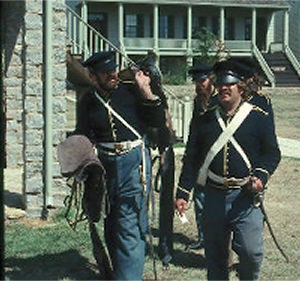
NPS Organizing the DragoonsThe First Regiment of Dragoons, organized in 1833, numbered about 623 men and was stationed in the West. The regiment was broken up into ten companies, with each company consisting of about 60 men-although sometimes the number was considerably less. The various companies were designated by a letter. Two companies, A and C, of the First Regiment of Dragoons established Fort Scott in 1842. Dragoons were an elite fighting force trained to fight both on foot and horseback. They were armed with a musketoon or carbine, a horse pistol and a saber. Each of the ten companies had a captain, a first lieutenant, and a second lieutenant. Among the enlisted men there were four sergeants, four corporals, two buglers, one farrier and-blacksmith and fifty privates. When a company fell below 27 privates, recruitment of replacements began. As many as three-fourths of the men who sought to enlist were rejected for medical reasons. Varicose veins were one reason for rejection, along with build (the average weight of American and foreign-born troops in 1855 was a little less than 150 pounds), goiter, habitual drunkenness, loss of teeth, deafness, stammering, and old injuries. A large portion of the enlisted were foreign-born, and had come to this country and were unable to obtain work. Unfortunate indeed was the sergeant, who found himself with a polyglot of languages and was unable to communicate with his eager but uncomprehending recruits. Public Perception of SoldiersMen joined the Army for many reasons; but civilians except during wartime, tended to look down upon the soldier of the nineteenth century, whom they regarded as lazy and unambitious. The ruffians of a company were misfits from civilian life, who joined the army to escape unpleasantness of one kind or another at home or perhaps were too lazy to find employment. This small core of men could make it unpleasant for the rest, and occasionally ill feelings resulted in murder. Settlers living on the frontier, however, had a different view and recognized their importance to their own safety. Supplying Army posts with hay and corn for the horses proved lucrative to many trying to eke out a living on the edge of settlement. Why Join?Some reasons for enlisting were recounted by Milton Jamieson, who wrote of the conversations of some of his fellow soldiers during the Mexican War:
Once accepted, a recruit was given his uniform, properly entered on the rolls, and sent to join his company. Augustus Meyers pointed out that soldiers, after serving together for a few months, became a large family. They knew each other's good points, failings and weaknesses. Factions tended to develop within a company. One party, the larger, contained the men who kept themselves clean and took some pride in soldiering. The other was quarrelsome, slovenly and disorderly. Because the latter was outnumbered, it rarely created much trouble in quarters; for the first contingent was ready to take the law into its own hands if necessary. This was especially true in cases of petty thievery, since the barracks provided no areas in which personal possessions could be locked. Information for this page came from the Historic Furnishings Report for The Dragoon Barracks by Sally Johnson Ketcham. Experience more Life on the FrontierBack to Virtual Resource Center HomeDragoon Soldier PagesOverview | Program Outline | Tools of the Trade | Regulations | Historical Background | Recruitment | Training | Command Structure | Daily Life | Expeditions |
Last updated: May 23, 2022
